4 Alternatives To Refined Sugar Your Sweet Tooth Will Love
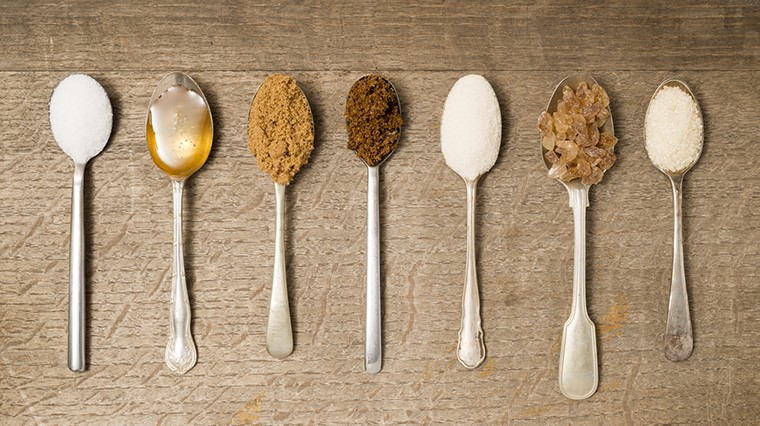
Hey sugar!
We love refined sugar as much as the next girl or guy (frosted donuts anyone?), but as much as it’s a party for our tastebuds it sure has a bad rap. It pains us to say it, but that bad reputation is for a good reason.
Refined sugar may give us a quick energy boost but this pure
white, heavenly powder is not what it’s cracked up to be on the nutritional
side of things.
In fact, it has zero nutritional value. None. Zip. Caput.
Blamo.
Refined sugar is a type of carbohydrate and this naughty
ingredient frequently disguises itself under other names - sucrose, fructose,
glucose, lactose and corn syrup to name a
few.
There’s no hiding from it. Added refined sugar is hidden in breads, cereals,
fruit juices, soft drinks, sauces - pretty much anything processed or that comes wrapped in
plastic is as risk - not to mention your favourite baked goodies from the cosy cafe
around the corner.
Refined sugar or ‘sucrose’ is composed of
fructose and glucose. These simple sugars are evident in natural foods such as
honey and fruit, but the major problem comes with the excessive amounts of added sugars in our diet (so if you're chomping down on an apple, munch away!).
Fructose in added sugars is believed to have a role in weight gain, increased LDL (bad cholesterol), high blood pressure, the development of
type 2 diabetes and heart and liver disease. However, it's important to look at genetics, diet and lifestyle choices as a whole when considering the cause of these conditions.
Is that the end for our sweet tooth? Is there a way to
get our fix of sweetness without the nasties?
You decide with these refined sugar alternatives.
Natural, Raw Honey (GI 35-64)
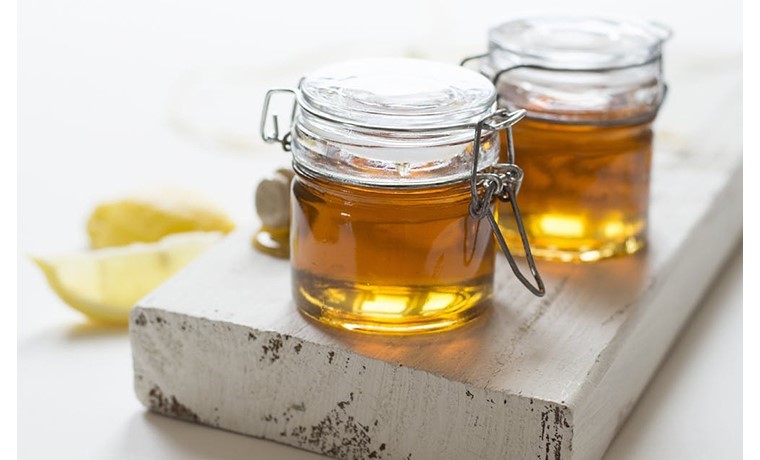
Sugar, ah, honey, honey. Natural, raw honey is honey at its best.
How’s it made? Bees
collect flower nectar as a viscous fluid and store it in the honeycomb. The bees fan the honey with their wings until
much of its moisture content evaporates and it gains a syrup like texture to
become the sweet, amber liquid we enjoy with our tea and toast.
Honey has a different taste and viscosity depending on the season and what types of flowers the nectar is collected from.
Raw, natural honey is a favourite option in the pantry with
the nutritional content preserved by removing the process of filtering and
pasteurising.
What’s the buzz on honey?
Compared to refined sugar, honey is digested slower for
sustained energy. It has immune boosting properties, is a natural remedy for
soothing a sore throat and as a prebiotic may promote gut health.
It contains valuable antioxidants (such as anti-inflammatory
flavonoids), particularly the darker varieties of honey, and is praised for its anti-bacterial
activity.
It is a source of amino acids, enzymes, vitamins including B1, B2, B3, B5, B6 and C, and minerals such as calcium, magnesium, iron, phosphorus,
potassium, sulphur, copper and zinc - although we do need to emphasise this
goodness is in trace amounts.
It’s also used in many cosmetic products for its healing
properties and to minimise scarring of the skin.
As it has a sweeter profile compared to refined sugar, 1/2 - 3/4
cup of honey can usually be substituted for 1 cup of table sugar.
Unfortunately, sugar does add up to about 75 - 80% of the
volume of honey. Although it is fat free, unless you stick to small portions,
honey may hinder your weight loss goals as it contains more calories than
sugar.
Bees have been on Earth longer than humans, so there’s no
doubt they’re on to something with this divine, golden concoction.
Just be wary
of its fructose and glucose content before getting caught with your hand in the
honey jar and enjoy sparingly.
Maple Syrup (GI 54)
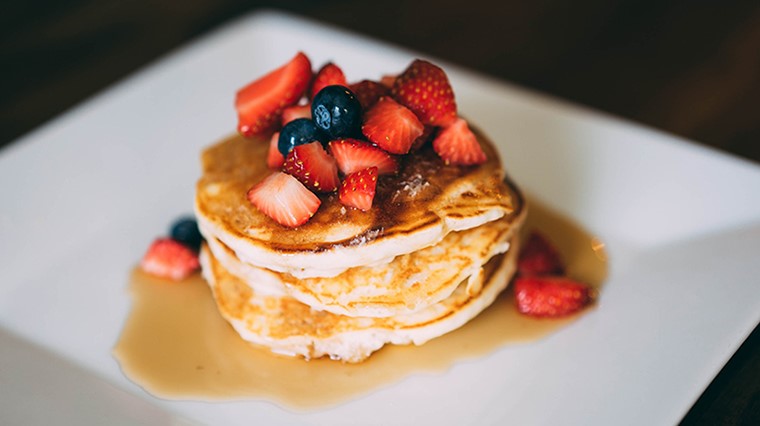
Imagine… a waterfall of maple syrup
flowing over a pancake stack. Pretty amazing stuff.
We personally call maple
syrup ‘liquid gold’ for its divine flavour and colour, but is it good for you?
Maple syrup is harvested from
sugar maple trees when their stored starch is transformed back into sugar in
the warmer spring temperatures of Canada. The majority of the water in the sap
is removed by boiling. The final result is composed of about 67% sugar,
containing up to 40% fructose.
Calling this delicious,
silky smooth sweetener healthy (totally not biased here!) may be a stretch, but
it does have a rich nutritional value. It is a source of vitamins including B6,
niacin, riboflavin and thiamin and minerals such as calcium, magnesium,
potassium, iron, phosphorus, sodium and zinc.
It is easily interchangeable
for honey, so it’s an excellent alternative for vegans to sweeten up their baked delights, coffee or tea.
It’s the
perfect topping to ice cream, but opt to make your own low-fat, low-sugar
version, yeah? If that seems an impossible task, keep it simple and drizzle on yoghurt.
Don’t be tricked by labels referring to ‘maple flavoured syrup’ or ‘golden syrup’. These imitations are usually full of artificial ingredients such as caramel colour without any of the health benefits. Natural is the way to go, justifying the increased price tag.
Coconut Nectar / Coconut Sugar (GI 35)
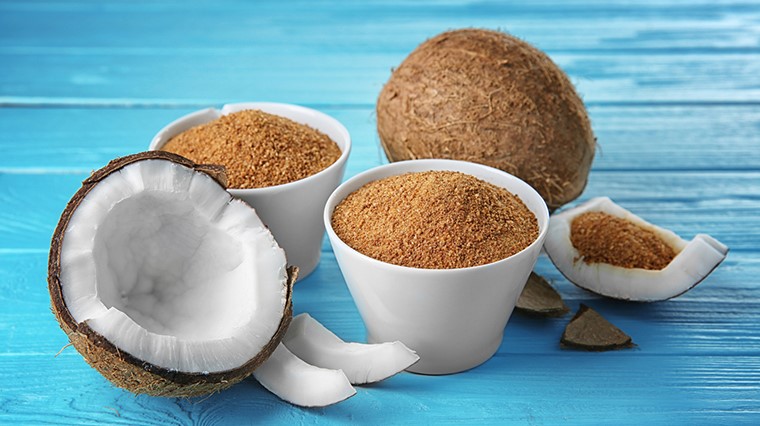
We have a confession. We’re nuts about coconuts.
Coconut nectar comes from the cut flower buds of the coconut palm (Cocos nuciferahas). In Sri Lanka and Indonesia it is collected with a similar tapping process as maple syrup.The rich golden sap flows into containers then is exposed to moderate heat to evaporate the excess water content, producing coconut nectar. Coconut sugar is the solid form of coconut nectar once it has been boiled down further and granulated.
Coconut nectar has a deep, full-bodied flavour, is subtler in its sweetness than maple syrup and doesn’t taste coconuty at all!
Coconut nectar contains 17 amino acids, with glutamic acid supporting healthy brain and metabolic function. It is a source of minerals including calcium, copper, iron, potassium, phosphorous, magnesium and zinc and vitamins such as B1, B2, B3, B6 and C.
It’s high in inositol (vitamin B8), which may help manage depression and anxiety, diabetes, inflammation and high cholesterol levels.
With a low GI (glycemic index) of 35, coconut sugar and nectar prevent spikes in blood sugar levels and provide a gradual release of glucose that may keep you satisfied for longer.
As coconut nectar is unprocessed, it retains these health benefits - from the coconut blossom and to the jar in your pantry.
Coconut sugar, also called coconut palm sugar (not to be confused with palm sugar) is praised for its sustainability as an eco-friendly sweetener.
Coconut nectar can be substituted for honey 1:1 and coconut sugar can be substituted for table sugar 1:1.
The bad? Despite the goodness in coconut nectar, if you weigh it up against refined sugar it contains nearly equivalent levels of fructose. Sorry to burst your bubble.
Go nuts for coconut sweeteners, but let’s make it in moderation.
Stevia (GI 0)
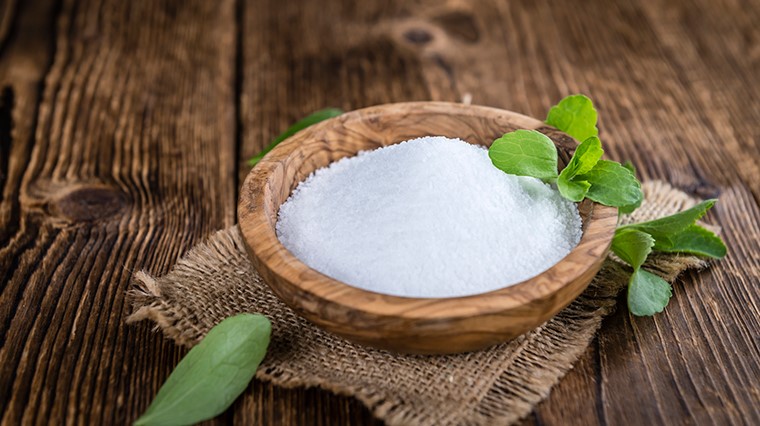
Stevia is sweeter than sugar (a tongue-tingling 300 times sweeter in fact!), but is it guilt free? Here’s the gist of it.
This calorie free (yes you heard right, calorie free!) sweetener is derived from the stevia plant (Stevia rebaudiana) that’s native to Paraguay. The sweetness in the leaf is attributed to its content of glycosides. The leaves in their processed powder form is usually what’s available on the supermarket shelves as a sugar-free sweetener.
With a GI score of 0, unlike refined sugar, stevia has absolutely no affect in raising your blood sugar. This makes it a valuable option for diabetics. Some studies have shown that stevia is not a contributing factor to tooth decay, so switching sugar for stevia initially only seems to have a bright side.
But it’s not all puppies and kittens. Stevia is known for its bitter after taste, and thus products advertised as sweetened with stevia commonly also contain additional sweetening agents to mask the flavour.
They’ve also been some
concerns that due to the sweetness of stevia, your body may anticipate a blood
sugar rise that never occurs and consequently, stress hormones are released,
but there doesn’t appear to be firm evidence for this. Others claim it may increase
your cravings for sweet foods, similarly to refined sugar.
Until more research is released on the topic, it’s difficult to say for sure if stevia deserves a gold star for sparking a health revolution, or whether it’s just the latest craze that causes us to dig into our pockets.
Nevertheless, stevia does works wonders in refined sugar free wholegrain oat and yoghurt breakfast muffins when balanced out with a smidgen of maple syrup to sweeten the deal.
To Sum It Up Sweetly
You've heard it a million times before, but moderation is key when it comes to sweetening up your diet.
Although we've highlighted natural alternatives to refined sugar, it's best to enjoy them wisely as an indulgence in a healthy, active and well-balanced lifestyle.
Give yourself a pat on the back for opting for low GI sweeteners and those that contain trace amounts of vitamins and minerals that your body loves, as opposed to empty calories like the white stuff.
All up, natural sweeteners are smiles in a jar (enjoyed sparingly) - and smiling is infectious so your buddies will also benefit even if you’re sneaky and don’t want to share a drop.
